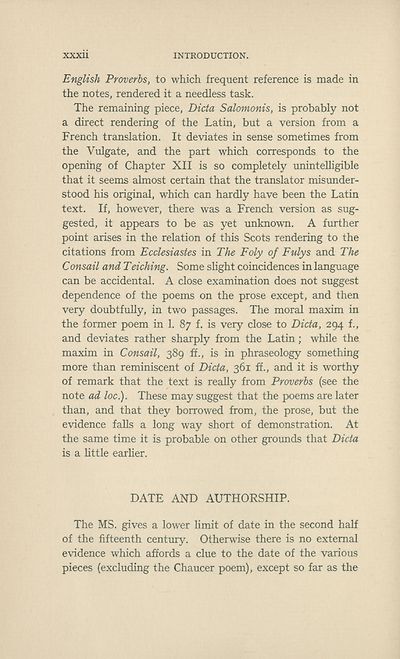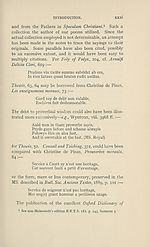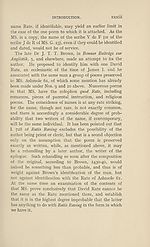Scottish Text Society publications > Third series > Ratis raving and other early Scots poems on morals
(42)
Download files
Complete book:
Individual page:
Thumbnail gallery: Grid view | List view

XXX11
INTRODUCTION.
English Proverbs, to which frequent reference is made in
the notes, rendered it a needless task.
The remaining piece, Dicta Salomonis, is probably not
a direct rendering of the Latin, but a version from a
French translation. It deviates in sense sometimes from
the Vulgate, and the part which corresponds to the
opening of Chapter XII is so completely unintelligible
that it seems almost certain that the translator misunder¬
stood his original, which can hardly have been the Latin
text. If, however, there was a French version as sug¬
gested, it appears to be as yet unknown. A further
point arises in the relation of this Scots rendering to the
citations from Ecclesiastes in The Foly of Fulys and The
Consail and Teiching. Some slight coincidences in language
can be accidental. A close examination does not suggest
dependence of the poems on the prose except, and then
very doubtfully, in two passages. The moral maxim in
the former poem in 1. 87 f. is very close to Dicta, 294 f.,
and deviates rather sharply from the Latin ; while the
maxim in Consail, 389 ff., is in phraseology something
more than reminiscent of Dicta, 361 ff., and it is worthy
of remark that the text is really from Proverbs (see the
note ad loc). These may suggest that the poems are later
than, and that they borrowed from, the prose, but the
evidence falls a long way short of demonstration. At
the same time it is probable on other grounds that Dicta
is a little earlier.
DATE AND AUTHORSHIP.
The MS. gives a lower limit of date in the second half
of the fifteenth century. Otherwise there is no external
evidence which affords a clue to the date of the various
pieces (excluding the Chaucer poem), except so far as the
INTRODUCTION.
English Proverbs, to which frequent reference is made in
the notes, rendered it a needless task.
The remaining piece, Dicta Salomonis, is probably not
a direct rendering of the Latin, but a version from a
French translation. It deviates in sense sometimes from
the Vulgate, and the part which corresponds to the
opening of Chapter XII is so completely unintelligible
that it seems almost certain that the translator misunder¬
stood his original, which can hardly have been the Latin
text. If, however, there was a French version as sug¬
gested, it appears to be as yet unknown. A further
point arises in the relation of this Scots rendering to the
citations from Ecclesiastes in The Foly of Fulys and The
Consail and Teiching. Some slight coincidences in language
can be accidental. A close examination does not suggest
dependence of the poems on the prose except, and then
very doubtfully, in two passages. The moral maxim in
the former poem in 1. 87 f. is very close to Dicta, 294 f.,
and deviates rather sharply from the Latin ; while the
maxim in Consail, 389 ff., is in phraseology something
more than reminiscent of Dicta, 361 ff., and it is worthy
of remark that the text is really from Proverbs (see the
note ad loc). These may suggest that the poems are later
than, and that they borrowed from, the prose, but the
evidence falls a long way short of demonstration. At
the same time it is probable on other grounds that Dicta
is a little earlier.
DATE AND AUTHORSHIP.
The MS. gives a lower limit of date in the second half
of the fifteenth century. Otherwise there is no external
evidence which affords a clue to the date of the various
pieces (excluding the Chaucer poem), except so far as the
Set display mode to: Large image | Zoom image | Transcription
Images and transcriptions on this page, including medium image downloads, may be used under the Creative Commons Attribution 4.0 International Licence unless otherwise stated. ![]()
| Publications by Scottish clubs > Scottish Text Society publications > Third series > Ratis raving and other early Scots poems on morals > (42) |
|---|
| Permanent URL | https://digital.nls.uk/106919845 |
|---|
| Description | A collection of over 100 Scottish texts dating from around 1400 to 1700. Most titles are in Scots, and include editions of poetry, drama, and prose by major Scottish writers such as John Barbour, William Dunbar, Gavin Douglas, and George Buchanan. Edited by a key scholarly publisher of Scotland's literary history, and published from the late 19th century onwards by the Scottish Text Society. Available here are STS series 1-3. |
|---|

